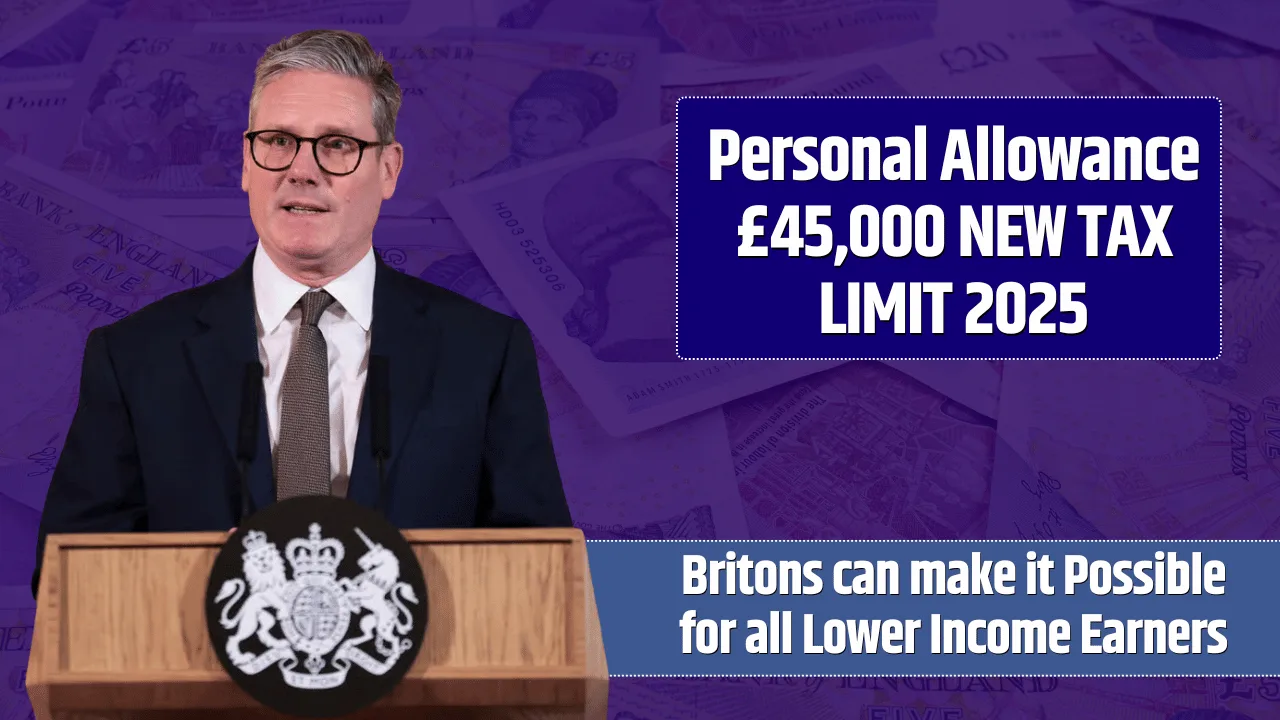In a groundbreaking announcement, the Department for Work and Pensions (DWP) has confirmed a massive increase in the personal tax allowance for the tax year 2025. The new threshold, now set at £45,000, is being hailed as a “historic move” that could redefine how millions of Britons manage their income, savings, and household budgets.
what is personal allowance?
Personal allowance is the amount of income you can earn each year without paying income tax. Previously, the standard personal allowance in the UK was £12,570. This allowance applied to most individuals unless they earned over £100,000, in which case it gradually reduced.
Now, with the personal allowance raised to £45,000, individuals will enjoy a much broader tax-free income bracket, offering significant financial breathing room.
why this change now?
The decision comes amid increasing pressure from both public and political groups urging the government to help working and middle-class families deal with the cost-of-living crisis. Skyrocketing energy bills, inflated grocery prices, and stagnant wages have all contributed to rising household strain.
Rishi Sunak’s government, facing upcoming general elections, has taken a bold step to provide real, tangible tax relief. The DWP, in coordination with HM Treasury, sees this move as not just economic relief but a stimulus for growth and stability.
who benefits the most?
This major adjustment in personal allowance is set to benefit a wide range of people:
- Full-time employees earning under £45,000 will now pay no income tax.
- Self-employed workers will see substantial tax savings.
- Pensioners with private or state income will be taxed much less or not at all.
- Low-income families will retain more of their earnings, aiding savings and daily spending.
It’s a universal win for middle and lower-income brackets, offering them much-needed support in a tight economy.
what about higher earners?
For those earning over £45,000 annually, the higher tax band will now start only above the new threshold. This means even higher earners will enjoy tax savings on the first £45,000 of their income.
However, individuals with annual incomes exceeding £100,000 may still experience a gradual reduction in personal allowance, as per the tapering rule. Even so, this policy shift could still result in thousands of pounds saved annually.
impact on national insurance
While this announcement focused on income tax, experts believe that a related revision in National Insurance contributions could follow. A similar restructure of the NI threshold would mean even greater savings for workers, especially those earning between £20,000 and £45,000.
Chancellor Jeremy Hunt hinted during the last fiscal statement that aligning NI thresholds with income tax brackets is under consideration, which may be unveiled in the Autumn Statement 2025.
boost for economic activity
Economists suggest that this unprecedented increase in personal allowance could stimulate consumer spending and business activity. When people keep more of what they earn, they’re more likely to invest in products, services, property, or savings.
Small business owners, freelancers, and gig economy workers may particularly benefit by having more disposable income to reinvest in their operations.
public reaction and political response
The announcement has drawn widespread applause from workers’ unions, financial experts, and average citizens. Social media is abuzz with people sharing how this change will help them manage rising living costs.
Opposition parties have cautiously welcomed the move but demand more clarity on how this tax relief will be funded. Some critics argue that while the allowance is welcome, it shouldn’t replace deeper reforms in social security and housing policy.
effect on pensioners and retirees
Retired citizens are among the biggest beneficiaries of this tax change. With many pensioners relying on a combination of state pension, private pension, and small savings, the raised threshold means they’ll retain a larger portion of their income.
This could especially help pensioners who previously had to pay tax on modest pensions, giving them a more comfortable retirement lifestyle.
what happens to universal credit?
There’s speculation that with this tax shift, the Universal Credit thresholds and taper rates might also be reviewed. The DWP has not yet released any official comment regarding direct changes to benefit caps or allowances.
Still, higher personal income could indirectly reduce dependency on state benefits and reduce DWP’s overall welfare burden, which may create space for benefit improvements later.
when will this change take effect?
The new personal allowance of £45,000 will officially take effect from 6 April 2025, aligning with the beginning of the new tax year.
Employers, accountants, and payroll software providers have already begun updating their systems in anticipation. HMRC will send out official notices to taxpayers early next year to explain how this impacts their tax code and deductions.
what should taxpayers do now?
While no immediate action is required, experts advise individuals to:
- Review their tax codes starting April 2025
- Update their income declarations with HMRC if self-employed
- Speak to a financial advisor or use HMRC’s Personal Tax Account service
- Consider adjusting workplace pensions or investments for tax efficiency
This is also an excellent time to explore ISA contributions, salary sacrifice schemes, or pension top-ups that can maximize this tax advantage.
how much will britons actually save?
Here’s an approximate savings breakdown under the new £45,000 threshold:
- Someone earning £30,000/year will now save around £3,500 annually
- A person earning £45,000/year will save up to £6,000 annually
- Pensioners earning around £20,000/year may save over £2,500 annually
These are not just numbers — this relief could mean better nutrition, medical care, and overall lifestyle for millions.
conclusion
The DWP’s confirmation of a £45,000 personal allowance for 2025 marks a monumental moment in UK tax policy. In a time of economic pressure and social uncertainty, this move offers hope and real benefit to hardworking Britons across the country.
It’s more than just a number on a payslip — it’s about empowering people to live better, save more, and look forward to a financially secure future. Whether you’re a worker, a parent, a student, or a pensioner — this tax shift could change your life.

